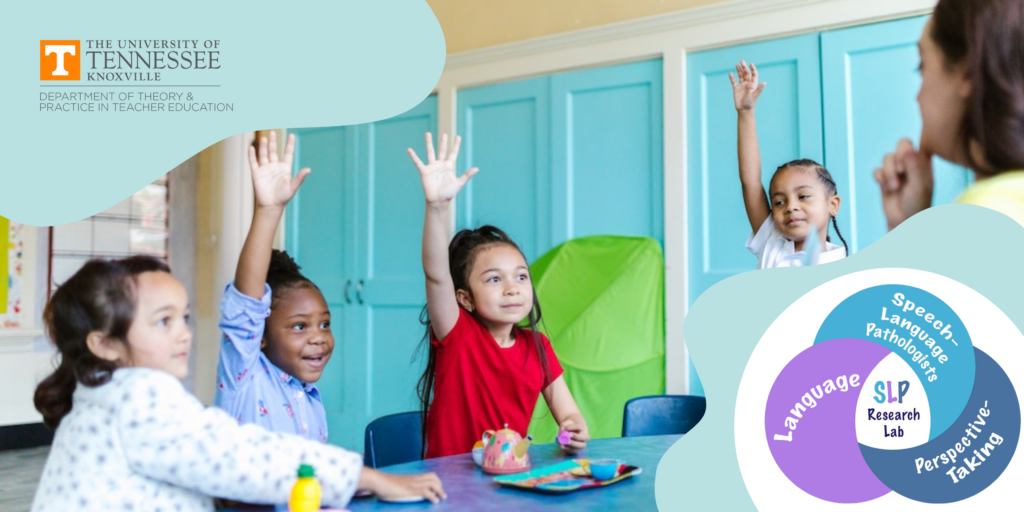The SLP Research lab focuses on the intersections between speech-language pathologists’ (SLPs’) preparation and practice, children’s language abilities, and skills associated with perspective-taking, with a particular focus on working with Deaf and Hard of Hearing students and their families.

Our current research focuses on:
- How can hearing parents best support their Deaf/Hard of Hearing child’s language and perspective-taking abilities?
- How can SLP programs increase their students’ awareness of the cultural and linguistic diversity associated with Deaf/Hard of Hearing (DHH) individuals, specifically those who use sign language?
- How can SLPs and Teachers of Deaf/Hard of Hearing students best work together to support the language and communication goals of their students?
- How can SLPs incorporate perspective-taking activities into therapy in a way that affirms all types of students, including those who are neurodivergent?
- Phillipakos, Z. & Secora, K. (2023). From Sounds to Letters to Words to Sentences: Oral Language and Writing. The Reading Teacher. https://doi.org/10.1002/trtr.2236
- Secora, K. & Shahan, C. (2023). How to Teach Collaborative Practices: A Focus on Speech-Language Pathology Students and Pre-Service Teachers of Deaf and Hard of Hearing Students. Submitted to Perspectives of the ASHA Special Interest Groups. https://doi.org/10.1044/2023_PERSP-22-00141
- Secora, K. & Smith, D. (2023). Use of a Living Document to Facilitate Critical Engagement with Social Justice for Undergraduate Audiology and Speech-Language Pathology Students. Teaching and Learning in Communication Sciences and Disorders. https://doi.org/10.30707/TLCSD7.1.1675490380.914027
- Secora, K., Wolbers, K., & Dostal, H. (2023). Writing Instruction as an Authentic Context for Targeting Speech and Language Therapy Goals for Deaf and Hard of Hearing Children. Perspectives of the ASHA Special Interest Groups. https://doi.org/10.1044/2022_PERSP-22-00168
- Lee, B. A. & Secora, K. (2022). Fingerspelling and Its Role in Translanguaging. Languages, 7(4), 287, 1-20. https://doi.org/10.3390/languages7040278
- Secora, K., Welch, A., & Park, E. (2022). ASL Assessment in Practice: Assessing American Sign Language Across Clinical Settings. Perspectives of the ASHA Special Interest Groups, 7(2), 400-417. https://doi.org/10.1044/2021_PERSP-21-00203
- Secora, K. & Smith, D. (2021). The Benefit of the “And” for Considerations of Language Modality for Deaf and Hard of Hearing Children. Perspectives of the ASHA Special Interest Groups, 6(2), 397-401. https://doi.org/10.1044/2021_PERSP-20-00267
- Secora, K. (2023, July). Including Theory of Mind (ToM) in Therapy from a Neurodiversity-Affirming Perspective. Poster presented at the 2023 ASHA Schools Connect online conference, refereed.
- Secora, K. & Lee, B. (2023, July). Fingerspelling as an Avenue to Support Literacy Goals for Deaf and Hard of Hearing Individuals. Poster presented at the 2023 ASHA Schools Connect online conference, refereed.
- Secora, K. (2023, March). Building Perspective-Taking Skills with Literacy Practices. Poster presented at the 2023 Council for Exceptional Children Convention and Expo, Louisville, KY, refereed.
- Secora, K. & Shahan, C. (2023, March). Interprofessional Education for Collaborating: A Focus on Pre-Service Teachers of Deaf and Hard of Hearing Children and Speech-Language Pathology Students. Poster presented at the 2023 Council for Exceptional Children Convention and Expo, Louisville, KY, refereed.
- Secora, K., Wolbers, K., Williams, K., & Dostal., H. (2022, July). One SLP’s Use of Strategic and Interactive Writing Instruction (SIWI) in Therapy: A Case Study. Poster presented at the 2022 ASHA Schools Connect online conference, refereed.
- Secora, K. (2022, Feb). Speech-Language Pathologists’ Assessment of ASL Across Educational and Clinical Settings. Poster presented at the 2022 Association of College Educators – Deaf and Hard of Hearing (ACE-DHH) Conference, Omaha, NE, refereed.
Hearing Parents with Deaf Children Study: How can hearing parents support the language development for their signing deaf children? We are currently recruiting hearing parents who have deaf children who use sign language to help us answer questions related to vocabulary development and reading practices with their deaf children. If you are interested in learning more about the study, please contact the research team at 865-974-0828 or at ksecora@utk.edu.
Volunteer/Student Opportunities
Volunteering in the SLP Research lab is a great way to familiarize yourself with how research is conducted as well as get hands on experience with data collection and analysis. Volunteers may contribute in a variety of ways, including but not limited to: stimulus development, data collection, data processing. If you are interested in volunteering in the SLP Research lab, please email Dr. Secora at ksecora@utk.edu.
Follow us on Social Media!
